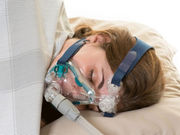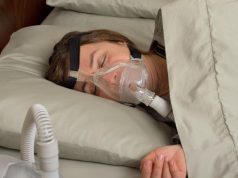Researchers find both common treatments produce modest BP decreases in sleep apnea patients
WEDNESDAY, Dec. 2, 2015 (HealthDay News) — Continuous positive airway pressure (CPAP) and mandibular advancement devices (MADs) each produce a modest reduction in both systolic and diastolic blood pressure rates in patients with obstructive sleep apnea, according to a meta-analysis published in the Dec. 1 issue of the Journal of the American Medical Association.
Malcolm Kohler, M.D., chair of respiratory medicine at the University Hospital of Zurich, and colleagues looked at the ability of CPAP and MADs to lower blood pressure in 51 previously published studies that included a total of 4,888 patients.
The researchers found that CPAP was associated with a reduction in systolic blood pressure of 2.5 mm Hg, and a reduction of 2.0 mm Hg in diastolic blood pressure. MADs were associated with a reduction of 2.1 and 1.9 mm Hg in systolic and diastolic blood pressure, respectively. Although no statistically significant difference between CPAP and MADs in lowering blood pressure was found, CPAP was more likely to have a strong association with lowering systolic blood pressure, Kohler said.
“CPAP and MADs not only reduce symptoms of obstructive sleep apnea such as sleepiness, but also lower blood pressure,” Kohler told HealthDay. “Both treatments have similar positive effects on blood pressure, but the treatment effect of CPAP seems to be larger in patients who have more hours of sleep.”
Abstract
Full Text (subscription or payment may be required)
Copyright © 2015 HealthDay. All rights reserved.








